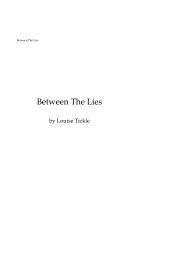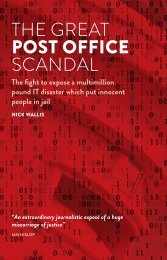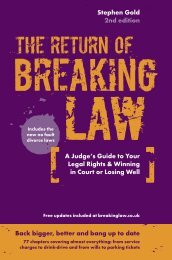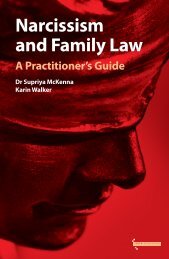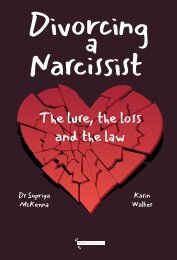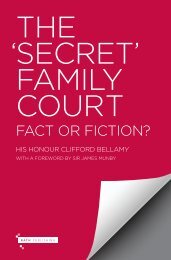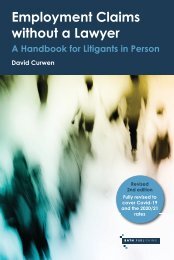Insolvency Made Clear: A Guide for Debtors
Plain English, practical guidance for anyone facing demands over a debt they are struggling to pay.
Plain English, practical guidance for anyone facing demands over a debt they are struggling to pay.
You also want an ePaper? Increase the reach of your titles
YUMPU automatically turns print PDFs into web optimized ePapers that Google loves.
<strong>Insolvency</strong> Law <strong>Made</strong> <strong>Clear</strong> – A <strong>Guide</strong> For <strong>Debtors</strong><br />
Box 8:<br />
PROOF OF DEBT<br />
Due to r14.2(1) all claims by creditors are provable as debts against the<br />
bankrupt, whether they are present or future, certain or contingent,<br />
and regardless of whether they have an ascertained value. The Trustee<br />
in Bankruptcy will decide what value to give to a proof of debt. The exceptions<br />
to this rule are fines, or claims <strong>for</strong> child support or family law<br />
proceedings. The significance of a proof of debt is that a non-provable<br />
debt will not be written off when the bankruptcy is discharged.<br />
A bankrupt might dispute the existence or size of the debt with a potential creditor.<br />
A Trustee is unlikely to continue this dispute because, unlike the bankrupt,<br />
they have no personal interest in the matter. From their perspective, a Trustee<br />
can either admit the debt upon seeing the evidence the creditor wishes to provide,<br />
refuse to admit the debt and see if the creditor wishes to sue them, or settle<br />
the claim with the creditor. Most potential creditors are unlikely to want to take<br />
a bankrupt to court because such action is expensive, and they know that there<br />
is little prospect of recovering the money.<br />
As part of this process, the Trustee will ask the bankrupt’s creditors whether any<br />
of them hold security. A debt secured on property is one where the creditor is<br />
entitled to the proceeds of sale of that property (or the property itself) if the debt<br />
is not repaid. This increases their chance of recovering their money.<br />
The Trustee will establish whether the bankrupt holds any property which does<br />
not belong to him. For example, if the bankrupt had a dispute about who owned<br />
particular property, the Trustee will decide who (in their opinion) the property<br />
belongs to. If the property belongs to the bankrupt, it will likely fall into the<br />
estate, be sold, and used to repay the creditors as a whole. If it belongs to the<br />
other individual, the Trustee will return it and that individual will be ‘repaid’ in<br />
full. If the potential owner does not agree with the Trustee’s decision, they are<br />
entitled to claim against the estate and the court will decide.<br />
2.8 Effect on the bankrupt’s career and business<br />
An undischarged bankrupt:<br />
• Cannot be a director of a company without the permission of the court.<br />
Even if the company is solvent, a bankrupt who is a director will have to<br />
change their role within the company fundamentally. It could be that the<br />
company simply asks the bankrupt to be an employee. However, it is a<br />
criminal offence <strong>for</strong> the bankrupt to serve as a director under s11 of the<br />
Company Disqualification of Directors Act 1986. A bankrupt may need<br />
26



